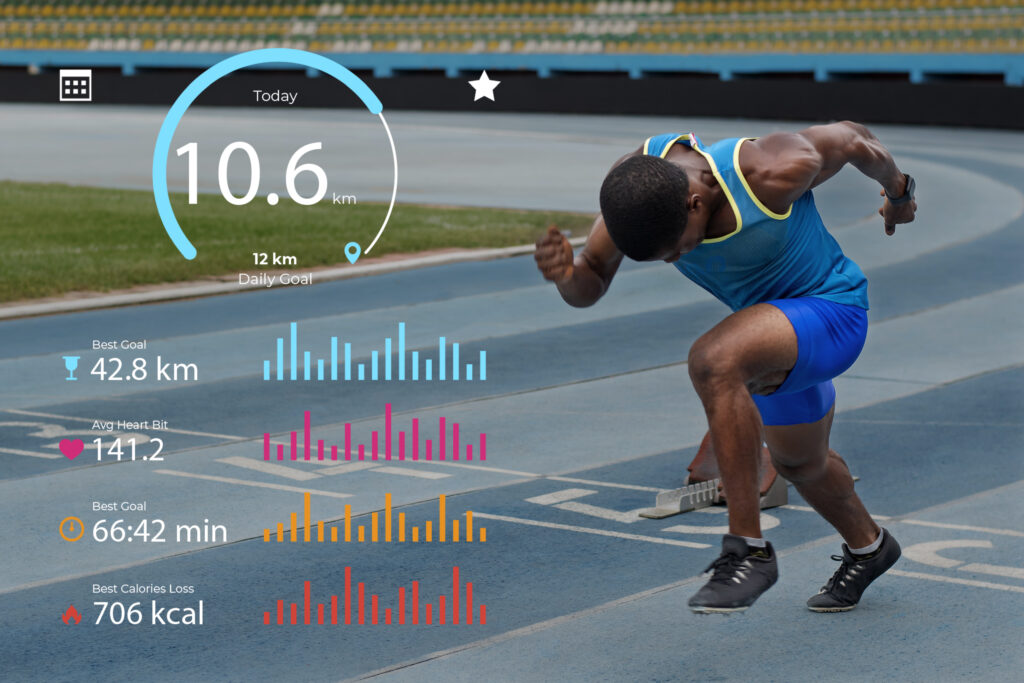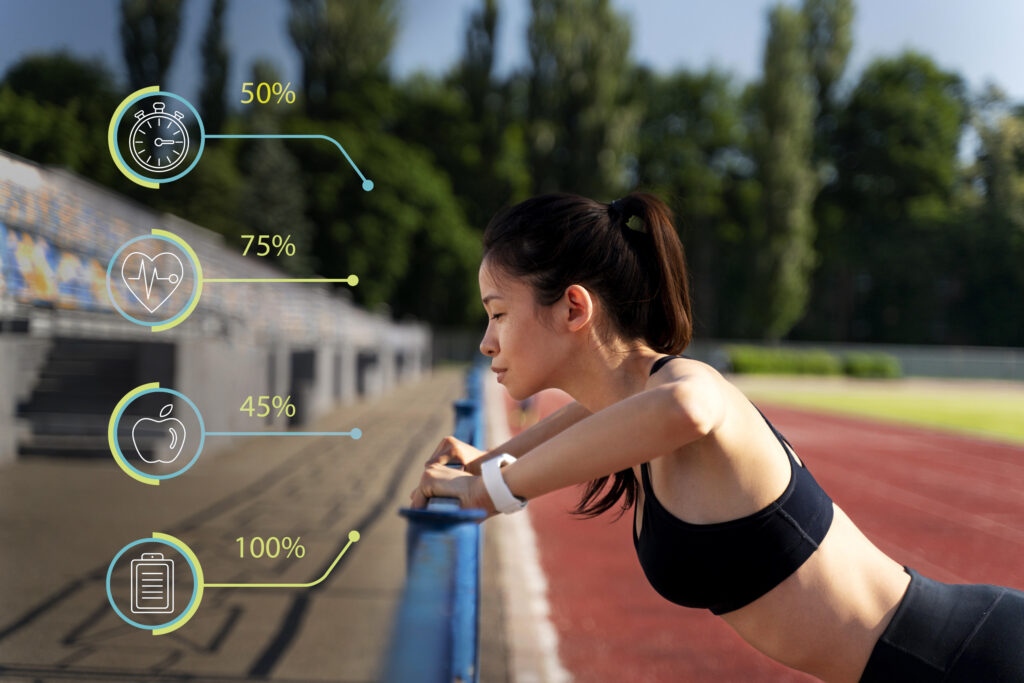Table of Contents
ToggleThe real secret to success in the competitive world of sports is athletic performance. Whether one is a professional or aspiring athlete, the drive to improve never fades away. And yet, how does this help sportsmen realize the full potential of their performance? In particular, the development of AI-based tracking systems has equipped athletes with powerful tools to track and improve their performance.
These analyze data in real-time and give insights to individual athletes on how they should train. This makes them train more intelligently and avoid injuries as they perform better. The AI sports market is said to climb to $30.98 billion by 2031, an increase in significance in sports. (Coherent insights)
This blog will examine how AI-powered athlete monitoring systems are revolutionizing the sports sector and providing coaches and athletes with a competitive advantage.

What Are AI-Based Tracking Systems?
With the help of machine learning and data analytics, AI-based tracking systems for sports enable systematic tracking of athletic performance for coaches and athletes. It aggregates large amounts of data during practice and competition, and the information insights can be used to optimize training, lower the risk of injury, and thus positively impact general performance.
How Does AI Technology Work in Athlete Performance Monitoring?
Machine learning algorithms, which examine data like movement, biometrics, and physical output, are the foundation of AI systems. Artificial intelligence (AI) can identify patterns in this data and offer tailored feedback. This makes it easier to design specialized training regimens that specifically meet the needs of an athlete. AI gives athletes the advantage of safely pushing their limits by improving the accuracy and efficacy of athlete performance tracking.
Popular AI-Based Athlete Monitoring Systems
Some of the popular athlete monitoring systems in sports performance rely on artificial intelligence. AI-driven performance analysis tools always make performance reportage real-time, thus enhancing stamina and skill levels without going overboard.
More and more, these AI-based technologies are becoming essential in improving athlete performance management and giving athletes chances to compete more effectively and to train more intelligently.
Why Athlete Performance Monitoring Matters
Monitoring helps an athlete perform their best and maximize their abilities. Performance monitoring helps to point out strengths and weaknesses of an athlete’s performance and directs training initiatives for continuous growth. Athletes have the leeway to change their training depending on data using structured feedback from athlete management software.
Traditional vs. AI-Based Performance Tracking
Tracking techniques in the past relied on manual observation, which was frequently imprecise. The emergence of AI-driven tracking systems has led to enhanced precision and customization in real-time data gathering and analysis. By using cutting-edge athlete monitoring techniques, these systems assist coaches in making well-informed decisions more quickly.
Benefits of Real-Time Data Collection
Real-time data collection provides instant insights with AI-driven athlete performance management systems, enabling athletes to modify their efforts during training or competition. This strategy makes the most of efficiency, guards against injuries, and guarantees that athletes continue on their intended path.
If you love sports analytics, this is a must-read!
https://www.checklick.com/how-to-track-athlete-performance-with-athlete-tracking-software/

Enhancing Athletic Performance with AI
AI technology has transformed athletic training and performance by providing tailored insights that improve results. Athletes can maximize performance and minimize injury risks by implementing customized training programs, predictive modeling, and real-time data analysis.
Data-Driven Insights
Performance analysis is being transformed by athlete monitoring systems. which offer real-time data on individual metrics. Coaches and athletes can precisely identify strengths and weaknesses by tracking movements, speed, and technique. This personalized data helps create effective training programs that focus on key areas for improvement, ensuring athletes develop in the right areas for optimal performance.
Injury Prevention
AI has a big impact on preventing injuries. With the analysis of biomechanical data and the monitoring of variables such as workload and movement patterns, athlete management software can forecast possible injury risks. By using these insights, AI software helps coaches modify their training plans, lowering the risk of overtraining and increasing the rate of recovery.
Tailored Training Programs
AI in sports management is excellent at creating customized training plans by examining the goals, fitness levels, and past performance of each athlete. As the athlete advances, these adaptable plans change to make sure they receive training that unlocks their full potential. AI makes sure athletes stay on the road to their best performance, whether it’s through dietary optimization or workout adjustments.
Real-Time Feedback
Athletes can make quick adjustments during training thanks to AI-powered devices that give instant feedback. Its real-time data feature is a game-changer, helping athletes fine-tune their techniques and pacing, thus pushing their performance to new heights.
Future of AI in Sports
AI in sports has bright prospects for a promising future, with the approach athletes should be adopting and competing expected to change enormously. As per expectations, the market for AI sports is estimated to reach a volume of $5 billion by 2025 through improvements developed in wearable technology and data analysis.
The software will enable the coach and the athlete to make better decisions, avoid injuries, and have more personalized workout programs. Those who adapt first will be at an advantage because they will remain ahead of the rest.
Athletes and coaches can improve their training and recuperation processes and obtain a competitive advantage by adopting these innovations. As AI technology advances,
For more insights, you can check the following link:
https://www.nature.com/articles/d41586-024-02427-0
In conclusion
AI in sports may change the game itself shortly as it has the potential to revolutionize athletic performance and training. The AI sports technology is expected to increase to $5 billion by 2025. Hence, they should be bold in making the best use of these developments to enhance decision-making abilities and reduce injury rates.
Checklick is an all-in-one Athlete Performance Tracking System that helps sports clubs simplify athlete evaluations and performance tracking. With its easy-to-use platform, coaches can assess skill development in real-time, improving training and club management efficiency. Are you prepared to raise the bar for your club? Checklick is available now.

